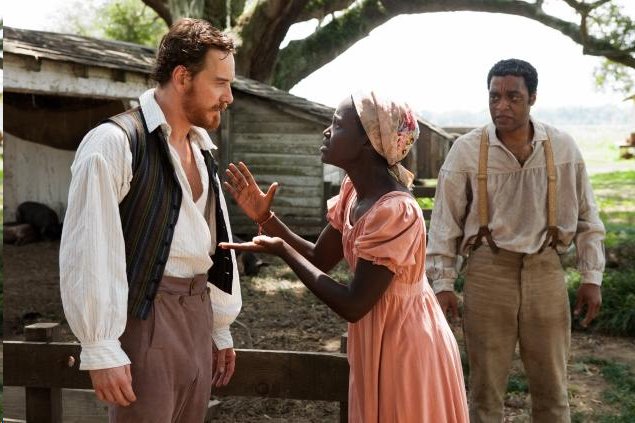6 Reason Why ’12 Years a Slave’ Matters

From The Root:
When 12 Years a Slave opened nationally last November, it launched endless conversations about the legacy of slavery and race in America.
Director Steve McQueen’s hauntingly graphic depiction of slavery even made some people declare they were sitting this one out because they couldn’t bear to watch. This may have included some Oscar voters, which led to talk that the film may have been doomed at Sunday’s Academy Awards.
The film has seeped into America culture. The long-term effects may never be fully measured, but the recent announcement that both the movie and the memoir on which it is based will be used in high school curricula ensures that people will be discussing it for years to come.
Here are six ways the film has been influential:
1. It introduced the world to Solomon Northup and the slave-narrative genre. Most people probably never heard the story of Northup, a free black man who was kidnapped and sold into slavery. But as pointed out by The Root’s editor-in-chief, Henry Louis Gates Jr., McQueen’s stunning depiction of Northup’s vividly detailed memoir helped revive interest in the book, which landed on the New York Times best-sellers list 160 years after it was first published. In its day, the book was also a best-seller and an important testament to the dangers free blacks faced while slavery continued in the South, something white abolitionists believed but couldn’t prove until Northup’s book came along.
2. It made (white) people talk about slavery. From the moment the film first screened at the Telluride Film Festival in Colorado last August, critics and culture writers were calling 12 Years the first movie to truly capture the horror and devastation of “America’s original sin.” Indiewire’s Eric Kohn called the film “a slavery movie for the ages.” New York magazine Vulture blogger Kyle Buchanan went Kohn one better, declaring in September—months before the Oscar nominations were even announced—that “Your Best Picture Winner Will Be 12 Years a Slave.”New York magazine’s Jonathan Chait, in a smartly written piece, hypothesized how Northup’s quiet dignity might explain the disdain some people feel for President Obama.
And even though Washington Post columnist Richard Cohen was (correctly) derided for not knowing how horrible slavery truly was, the one kernel of truth he did get right was that schools have done a pretty crappy job of teaching slavery. Now that the memoir and the film will be available to high school teachers, perhaps that will change.

3. It announced the arrival of a new Steve McQueen to Hollywood. For people of a certain age, hearing the name “Steve McQueen” evoked memories of the tough-guy actor known as “the King of Cool,” who generally gave bad dudes a hard time and drove fast cars in movies and real life.
But with just three feature films to his name, British director Steve McQueen has proved himself to be an artist completely in control of his craft, who possesses the skill to tell gut-wrenchingly difficult stories about complex characters—his 2011 film Shame offers a look into the life of a man in the throes of sex addiction, while 2008’s Hunger tells the harrowing true story of Irish hunger strike leader Bobby Sands (like 12 Years a Slave, both films featured Brit actor Michael Fassbender).
4. It made everyone learn how to pronounce “Chiwetel Ejiofor.” The role of Solomon Northup turned this British actor of Nigerian descent into a household name and an Oscar nominee. With his star definitely on the rise, Ejiofor may soon find himself in the same league of leading men alongside Denzel Washington, George Clooney, Matthew McConaughey and Brad Pitt. And if you’re still unclear on how to say his name, you better go here.
5. It gave Hollywood a new “it” girl—Lupita Nyong’o. What can we say—The Root loves her. The fashion world loves her. The Screen Actors Guild and critics love her. Will Oscar voters love her, too? Nyong’o, who scored a best supporting actress nomination nod for her debut role as slave girl Patsey, is in a dead-heat battle with still-“it” girl Jennifer Lawrence. Hollywood hasn’t been this gaga for a newcomer since Lawrence earned an Oscar nomination for her breakout role in 2010’s Winter’s Bone. Since then, Lawrence has scored two more Oscar nods—including a best actress win for 2012’s Silver Linings Playbook—and starring roles in two epic franchises: The X-Men and The Hunger Games. Let’s hope Hollywood showers the same level of love on Lupita.
6. It reminded African Americans that they are descendants of some of the strongest people on Earth. As difficult as it was to watch the unrelenting brutality depicted in the film—which one writer described as “the Disney version” of slavery because it didn’t go far enough in showing how awful human bondage was for blacks—the one bit of comfort that could be gleaned from those moments is that every effort by white slave owners to destroy the humanity of blacks was a complete and utter failure. The slaves who endured—and survived—such horrific conditions gave rise to generations of African Americans who continued to fight and scratch so that they could hold America to its core principle that all are created equal.
Author Bio:
Genetta M. Adams is a contributing editor at The Root. Follow her on Twitter.





























































































































































































































































































































